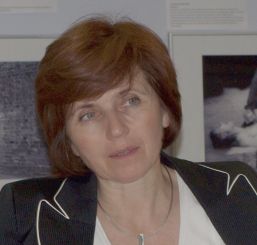The program designed for 1 year, carried out simultaneously for Azerbaijan, Belarus, Moldova, Russia and Ukraine, aims to train lawyers and attorneys to use in the jurisprudence international and constitutional law.
The project “Electronic Human Rights Education for Lawyers (EHREL) is a two-level learning programme, which consists of interactive training for lawyers, expert consultations, essay preparation and exams, individual appeals to the UN Human Rights Committee and electronic tests.The overall objective of the project is to improve protection of fundamental freedoms based on the rule of law, to raise awareness and provide a direct application of international human rights standards.
 The project coordinator Liudmila Ulyashyna (left) talks on its objectives:
The project coordinator Liudmila Ulyashyna (left) talks on its objectives:
– There is still a very significant shortage of lawyers and attorneys who know the mechanisms for the protection of human rights, both on a national and international level. Most often, lawyers are using only national legislation, which frequently only makes the situation more difficult, because during the preparation of this legislation as well as during the formation of practice, international standards developed by the best minds of the world and reinforced by already existing solutions have not been taken into account. Deficiency of such knowledge depends not only on the fact that university curricula are not sufficiently focused on the practical application of this knowledge, but also on the fact that the state is not ready to take a critical look at its legal system, and guarantees and obligations of international treaties are still considered as declarative. Therefore, the gap between knowledge, theory and practice is very large. This course takes the liberty to fill this gap by specific knowledge of international standards and ideas about how they should be applied at national level.
125 lawyers and advocates, as well as undergraduates of law schools, university professors – 25 students from each country, selected on a competitive basis will be able to pass theoretical and practical training in the 7 compulsory and 4 elective courses on application of human rights concepts and international legal standards in national and international legal protection, including the European Court of Human Rights and the UN Committee on Human Rights.
According to project leader Liudmila Ulyashyna, all participants are united in a strong network and actively share experience and advice:
– A network of lawyers has emerged, lawyers who no matter where periodically meet in the forums to discuss issues arising.And they find collective solutions. I think that today it is the clearest example of such a network. Sometimes these discussions include experts as well, which adds to the efficiency. An example of networking is conferences that take place. For example, recently the Belarusian Human Rights House held a conference for lawyers from 4 countries, where they discussed issues of institute of legal aid for lawyers and the elements that lead to the fact that the right to protection in those countries is violated.At the last meeting one of the graduates said that it was important to understand that she was not alone, that there are people in other countries and even in different regions of one country who think the same way she did.
***
The program is certified by the European Humanities University (Vilnius, Lithuania) and was held outside expertise by the leading organizations in the field of distance education of human rights Human Rights Education Association.Distance learning is the main form of communication in a program, lectures and materials designed specifically for this program are posted on the Internet platform CMS Moodle.
All the participants of the programme will be invited to participate in the regional seminar to be held before the start of a distance course in each of the abovementioned countries, tentatively in March 2012. Program participants who showed the best results in training, will have the opportunity to participate in a regional conference for participants from countries and a final international conference in April 2013, which will be held in Vilnius (Lithuania).
For more information – here .
Related articles
Human rights defenders and lawyers: cooperation and mutual support


